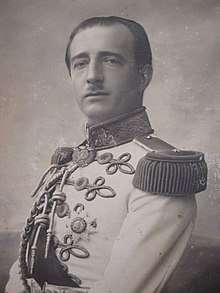Legality Movement
The Legaliteti (Albanian: Lëvizja Legalitetit; English: Legality Movement) were an Albanian royalist and pro-monarchy faction founded in 1941. It was led by Abaz Kupi.[1]
| Legaliteti | |
|---|---|
| Participant in World War II | |
.svg.png) Coat of arms of the Albanian Kingdom | |
| Active | 1943–1945 |
| Ideology | Monarchism Albanian nationalism |
| Leaders | Abaz Kupi |
| Headquarters | Mat |
| Area of operations | Albania |
| Allies | Allies, Great Britain |
| Opponent(s) | Albanian partisans Axis |
| Battles and war(s) | Albanian resistance of World War II |
Ideology

The Legaliteti sought the return of King Zog, who had fled the country on the eve of the Italian invasion.[2] The Legaliteti consisted of supporters from mostly the northern mountain tribes, particularly the Mati region. The Legaliteti were anti-communist. Despite being nationalistic, the Legaliteti were against the Balli Kombëtar as the Balli Kombëtar were the patriots and pro-republic while the Legaliteti were loyalists and royalists.[3] The Balli Kombëtar believed the cession of the Monastery of Saint Naum to Yugoslavia by King Zog to be a criminal act. The Legaliteti believed in the ideas of King Zog and Essad Pasha, while the Balli Kombëtar believed in the ideology from the likes of Naim Frashëri, Avni Rustemi, Fan S. Noli and Luigj Gurakuqi.[4][5]
History
The negative action of the Albanian Communists on the Kosovo issue alienated a significant number of its adherents from that border region. Following November 1943, Abaz Kupi, until the Mukje Agreement, was a member of the Central Council of the NLM, withdrew with others to form the Legaliteti. Kupi was a respected Gheg chieftain who had commanded King Zog's troops in Durrës when the Italians invaded Albania. In the early 1940s, three new political factions emerged within Albania after the Italians were defeated: the Albanian Communists, Balli Kombëtar (National Front), and Legaliteti (Legality). The Allies originally supported the Legaliteti. Being the smallest faction with no significant influence in Albania, the Allies broke aid with the Legaliteti and aided the Yugoslav Partisans, who in turn backed the Albanian communists.[6] In 1945, the Albanian communists assumed control over Albania at the end of World War II. Most Legaliteti members were executed or had escaped to the west.[6]
Legacy
The monarchist Legality Movement Party takes its name from the group.
References
- Irene Grünbaum (1996). Escape Through the Balkans: The Autobiography of Irene Grünbaum. ISBN 0803270828. Retrieved 31 January 2011.
- Peter Lucas (2007). OSS in World War Two Albania by Peter Lucas. ISBN 9780786429677. Retrieved 31 January 2011.
- Hutchings, Raymond (1996). Historical Dictionary of Albania. Lanham, Maryland: Scarecrow Press. p. 148. ISBN 0-8108-3107-4. LCCN 95-26304.
- British Society for International Understanding. "British survey, Issues 178-213". Missing or empty
|url=(help) - Eugene K. Keefe, American University (Washington, D.C.). Foreign Area Studies (1971). Area handbook for Albania. 1970. Retrieved 31 January 2011.CS1 maint: multiple names: authors list (link)
- Walter R. Roberts (1987). Tito, Mihailović, and the allies, 1941-1945. ISBN 0822307731. Retrieved 31 January 2011.
Further reading
- Histoire de l'Albanie et de sa maison royale (5 volumes); Patrice Najbor - JePublie - Paris - 2008
- La dynastie des Zogu, Patrice Najbor - Textes&Pretextes - Paris - 2002